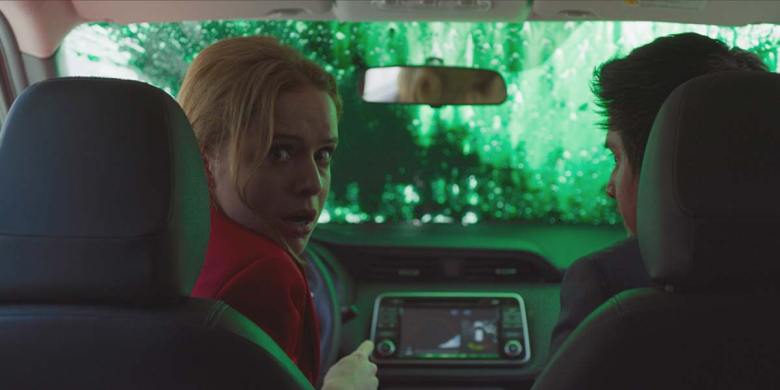The penultimate day of press screenings ahead of the Festival’s closing day on Saturday, Friday the 16th’s catalogue of films delivered the heaviest of burdens, with gory sci-fi horrors, a journey into the heart of darkness that’s a literal as it gets, exploring the legacy of colonial genocide in Africa and a heavy-handed dramatization of the rise of a fascist police state. The film’s may vary wildly in tone and style, and I would have liked to have seen them in a different order, but they all pack punches ranging from the feral to the sobering.
Possessor
There have been a surprising number of cases of the children of directors emerging as accomplished filmmakers in their own right, and such is the case of Brandon Cronenberg, son of celebrated purveyor of surreal and visceral body-horror David. Although Brandon certainly does stick to the family colours, as opposed to forging his own distinct path the way someone like Sofia Coppola has done, it’s undeniable that he does daddy proud with this venomously gory and hallucinogenic dive into the horror of the self.
The film follows Tasya (a ripe role for the often underused Andrea Riseborough), an operator for a corporate assassins’ syndicate that uses advanced technology to operate the bodies of human puppets to kill their targets. She is separated from the father of her son and struggling to keep both her life as an assassin and a tentative hold on her role as a mother. When she is assigned to possess the body of Colin (Christopher Abbott) the future son in law of a CEO (Sean Bean) to kill him and his daughter (Tuppence Middleton), lines become blurred once again as he slowly begins to reject her mind and regain control, placing Tasya’s own mind at risk.
Regularly playing out as a more interesting, NC-17 rated version of Inception, Possessor is vividly gory from the first to the last, more so in fact than any of Cronenberg snr’s work, but the imagery is not restricted to mere gore. The moment of leaving one’s own body and entering another’s is realised by brilliantly haunting sci-fi imagery reminiscent of the iconic title sequence of Ghost in the Shell and the many moments of full frontal male nudity include a moment that could be read as a subtle nod to the cut alternate ending to Videodrome.
The film’s early scenes are full of imagery of puppetry, virtual reality, remote operation, and the invasion of privacy. In one of the film’s many moments of black comedy, Colin is revealed to work on a factory floor hacking people’s webcams to see what kind of curtains they buy. Some critics have also connected Tasya’s form of murder to the drone strikes used by the modern military, an apt piece of allegory. However, my own understanding of the film goes a little deeper, into something harder to define, ideas of losing control of one’s own actions, the false fronts we may put on for those around us, and the existential horror of the self. No matter how we may try, we will never be anyone other than the person we are, as much as we may come to loathe that person and yearn to destroy them, to listen to the voice that cries “jump” as we stand on a tall building.
The entirety of Possessor exists in and returns to the unconsummated moment of self-obliteration, and the moment we sever ourselves from our humanity, becoming capable of the irrational and inhuman. The most important line in the entire film comes near the start, when Tasya reminisces on the day, as a child, that she killed and mounted a butterfly, and says she immediately began to feel guilty, and significantly, that she still does. Make a note of this moment and remember it right to the end.
I have heard many writers struggle to fit Possessor into any one genre, as it contains iconography of science fiction and of a thriller, some parts are even possessed with the most jet black of humour. However, a look into its themes and I have no difficulty assigning it the category of horror, it’s a cathartically sinister and malevolent film with an atmosphere even the sharpest knife wouldn’t penetrate.
African Apocalypse
“The conquest of the Earth is not a pretty thing when you look into it too much.”—Heart of Darkness, Joseph Conrad
One of the more unexpected gems of the festival comes in the form of Rob Lemkin’s extraordinary documentary, African Apocalypse. Although it’s Apocalypse Now that the title invokes, African Apocalypse and its subject, poet and activist Femi Nylander, set out to parallel the source novel, Joseph Conrad’s Heart of Darkness. The documentary begins with Nylander’s personal discovery of the novel, whereupon he set out to research the kinds of real events taking place in Africa at the time, which Conrad’s novel was intended to criticise.
In his research, he discovered one individual whose story eerily paralleled that of the fictional plantation owner Mr Kurtz, and indeed Colonel Kurtz from the Coppola film. That was the unhinged French Captain Paul Voulet, who in 1898–1899, concurrent with the publication of Conrad’s novel, led a “mission of pacification”, to find a route through Niger to Lake Chad, and left tens of thousands of murdered Africans in his wake: shelling towns and butchering or enslaving survivors. French military reports from the era on his progress are read in voiceover, alongside extracts from Conrad’s novel, and it is often difficult to tell the two apart, as Voulet broke off communications with Paris and began to suffer nightmares.
Nylander then set out to retrace Voulet’s journey through Niger, setting off with two guides, Ameena and Asani, to travel inland along Voulet’s route, now the national highway. Speaking to the descendants of his victims along the way, he and his crew see what has become of the communities Voulet and his campaign all but eradicated, and discover that the impact of his genocidal rampage is all but healed. He is greeted eagerly by the villagers who remain, who tell him he, a student from Oxford, is the first European to ask what happened to their community a century ago, assembling “as if they had been waiting to be asked about Voulet”.

As much as the film offers a rare spotlight on the testimonies of the Africans and their descendants, it is Nylander whose often somewhat innocent presence makes the film such a vivid curiosity. His occasionally naïve sensibilities also lead to some superb moments, as when his guide chides him for being too respectful at the graveside of a mass murderer, or when they confront him for seeming too desensitised to the brutality of Voulet’s crimes. Although he is the child of Nigerians, who migrated from an area near to that colonised by Voulet, he is also British, and according to some locals, therefore “may as well be white”, and his own sense of adolescent confusion is immensely grounding and humble.
Some turns in the climax are a little abrupt and the film could do with a polish, but it has a youthful openness and honesty rare in documentary cinema. It’s immediately apparent while watching that this is the product of a new generation and their attempts to fairly understand their history and its ongoing impact. Ultimately alighting upon the need for change and an end to European exploitation of the African continent and its people, resulting in perhaps the film’s most powerful image: the grave of a war criminal, and in the background, a new generation of Africans setting up their new solar panels.
New Order
In what is no doubt destined to be one of the most polarising films of the festival, director Michel Franco dramatizes a society’s fall into civil disorder and unchecked authoritarianism, the “new order” of the title. Beginning with the wedding of an affluent family which soon becomes besieged by a murderous revolution, the film then follows two families, one wealthy, the other poor, as they struggle to stay alive in the brutal new normal after a young bride (Naian Gonzalez Norvind) is kidnapped and held for ransom. Events soon spiral into riots, violent mass rape and executions, painting a vision of a fascist uprising that is both absurdist, empty and ultimately shallow. For all its force and supposed anger, New Order projects an adolescent immaturity that always leaves it feeling nihilistically divorced from reality, in a way that feels more like tasteless provocation than urgency.

The initial scenes of unrest and class warfare dig no deeper than “poor people = angry”, and the latter half attempts to echo the sheer unrelenting brutality of a film like Come and See, but without the justification of historical accuracy. Instead, like the tormentors it depicts, the film takes a sadistic delight in offering audiences a glimmer of hope in order to snatch it away again.
It’s perhaps telling that the sci-fi thriller screened earlier did a more convincing job exploring these themes, almost incidentally, than the arthouse drama that devoted itself solely to them did. Equally, coming so soon after African Apocalypse, a film which handled the subject of mass execution with such admirable tact and positivity, the flaws in Franco’s approach seemed unusually evident. It certainly leaves you shaken, but it fails to achieve the much harder goal of leaving you thinking.



